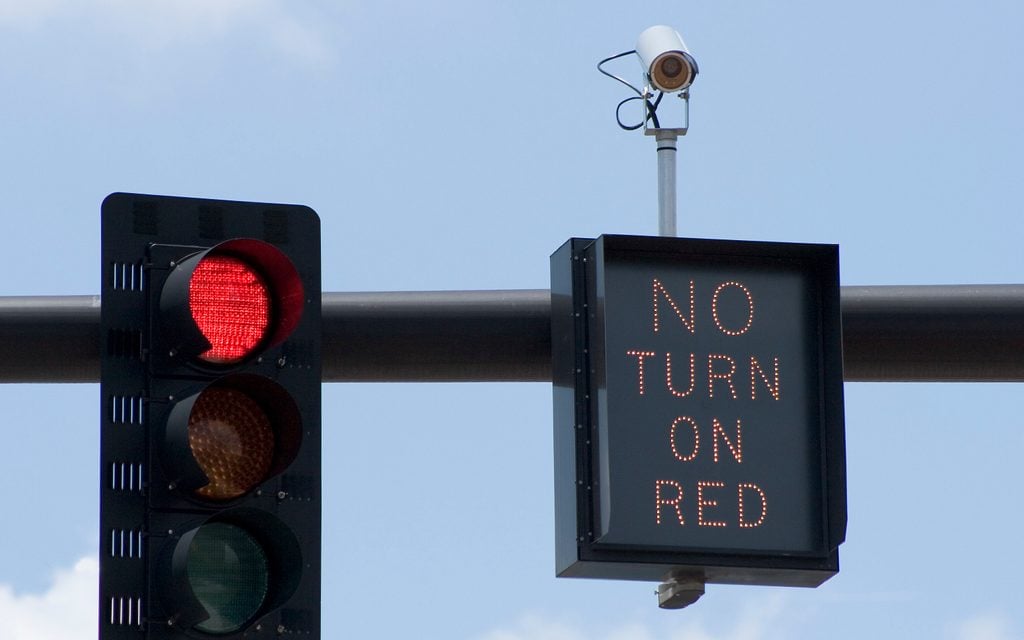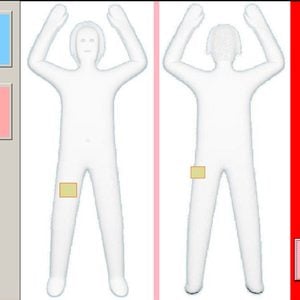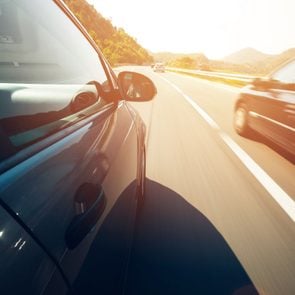How Do You Know If a Red Light Camera Caught You?
Updated: Jan. 31, 2024

Red light cameras aren't snapping pictures constantly. Here's how they really work—and how you'll find out if you've run afoul of one. (Please drive safely!)
The looming, almost mythical, threat of a red light camera is one that’s probably piqued every driver at some point. Obviously, you shouldn’t be intentionally running red lights willy-nilly, but even the best drivers have probably tried to beat a yellow light only to see it turn red before they’re quite through it, or turned right on red only to wonder, “Wait, was I allowed to do that?” And it makes sense—turning right on red is one of the most confusing driving rules.
Whether you think they’re a reasonable safety measure or 1984–level creepy, you’ve probably wondered how they work at some point. They’re something of a film trope—Nicolas Cage notably used one to decipher a National Treasure clue—but how common are they at real-life traffic intersections? And if one does snap a picture of you, how will you know?
How do red light cameras work?
The cameras themselves actually don’t “track” when a car goes through a red light. They interface with sensors, installed in the road, that do the tracking. “When a vehicle drives into the intersection and passes the stop line,” explains David Reischer, Esq., Traffic Law Attorney at LegalAdvice.com, these sensors “trigger the camera.”
However, what they actually photograph can vary from state to state, explains Jeff Westover, a former Washington state police officer and owner of several 911 Driving Schools in Washington. For instance, he explains, “Washington state law prohibits a picture or video of the face of the driver, so the violations recorded in Washington state are all of the rear of the vehicle.” However, “other states may differ and have a view of the driver of the vehicle.”
Next, find out why traffic light colors are red, yellow, and green.
What percentage of traffic lights have them?
There’s no precise figure for how many intersections use red light cameras since every locality is different. “Each municipality across America has different operating budgets and traffic safety programs for implementing red light cameras,” Reischer explains. But the bottom line is, they’re not all that common. “They are very expensive to install,” Westover says. “Most jurisdictions have the cameras installed on their most dangerous intersections (those with a higher percentage of crashes due to violations).” Reischer adds that a rural area without much heavy auto traffic may not have any, while a busier urban area “could easily have 15 percent or more of their traffic lights with a red light camera.” That’s still probably fewer than you might think, though. Despite how rare these cameras are, that doesn’t mean you should start being lax about these subtle driving mistakes that can get you pulled over.
If one catches you, how will you find out?
Well, for one thing, you can be “caught” by a red light camera and not actually be punished for it. “In Washington state, the violation has to be reviewed and approved by a commissioned officer before it is issued,” Westover says. For instance, your car could just pass the sensor when the light is red, but not actually enter the intersection. So the officer would not actually deem it a “violation.”
But if you are found guilty of a violation, what will happen? “Typically, the Department of Motor Vehicles (DMV) for each state will send a red light camera ticket via postal mail based on the registration information that is associated with the license plate,” Reischer explains. He adds that some municipalities have apps that can contact the guilty party via text or email instead. The fines themselves can vary, he adds: “In New York, they are $50 per occurrence, but every municipality can set the penalty accordingly.”
Once you receive the ticket, you’ll usually have a time limit by which to pay it. And if you don’t pay? “The unpaid violations can be sent to collections,” Westover says, “but this is dependent on state laws and jurisdictional involvement.” Unless you weren’t the driver of the car—in which case you’ll need to supply the name of the actual driver—you’re probably best off just paying the fine, because the eventual consequences likely won’t be worth it. Your violations being sent to collections is also one of the things that can happen if you don’t pay parking tickets.
Sources
- YouTube: “National Treasure: Book of Secrets – Car Chase | Part 2”
- David Reischer, LegalAdvice.com
- Jeff Westover, 911 Driving Schools



